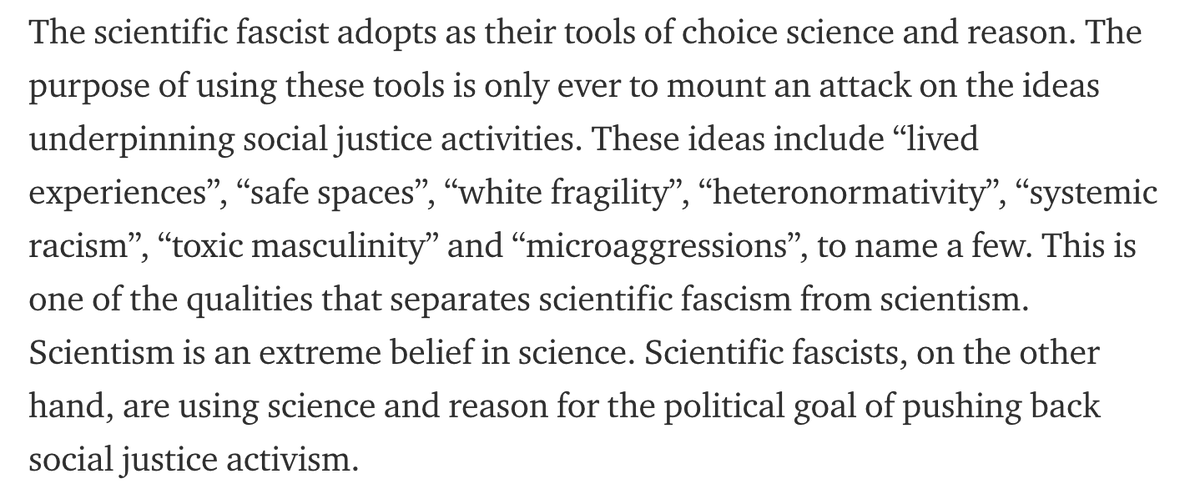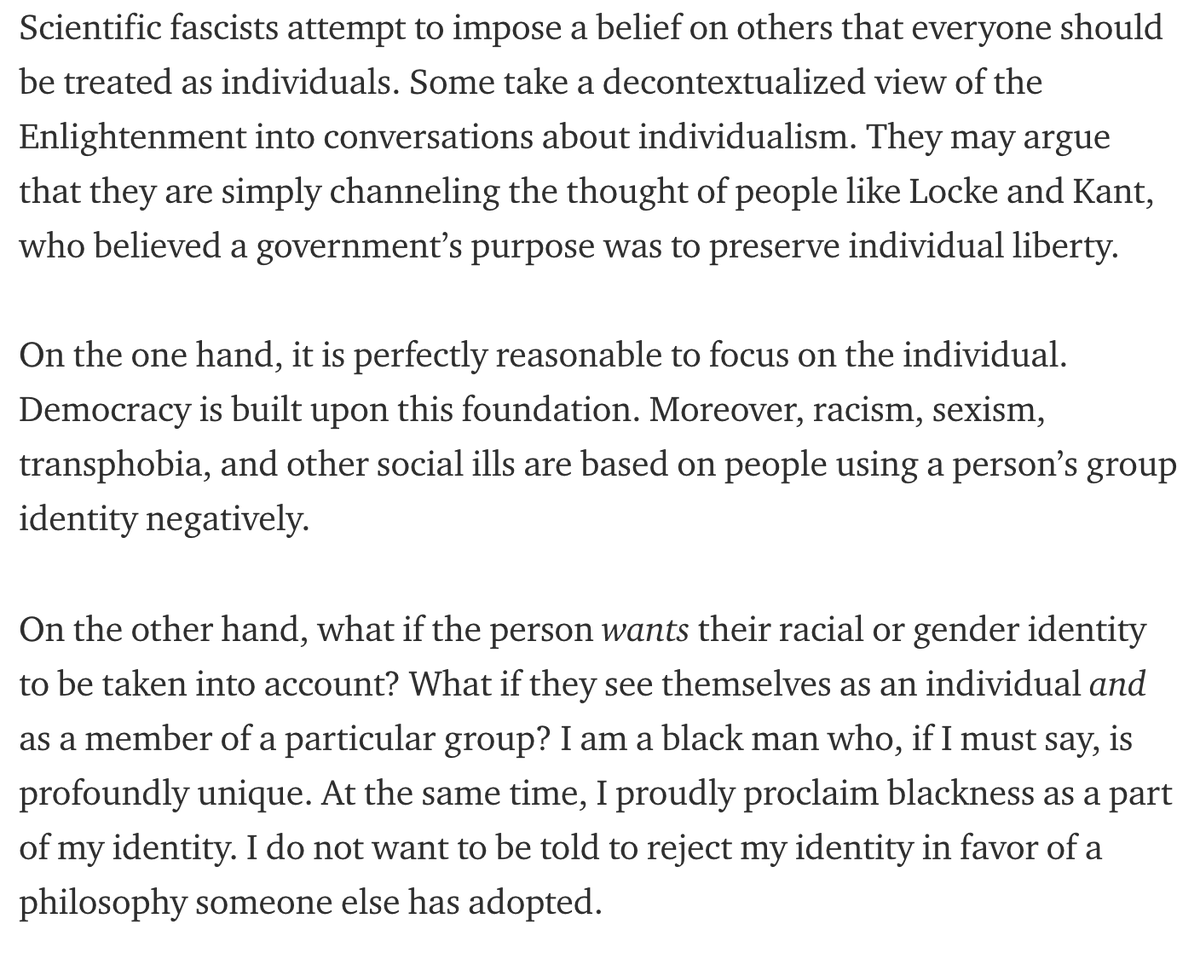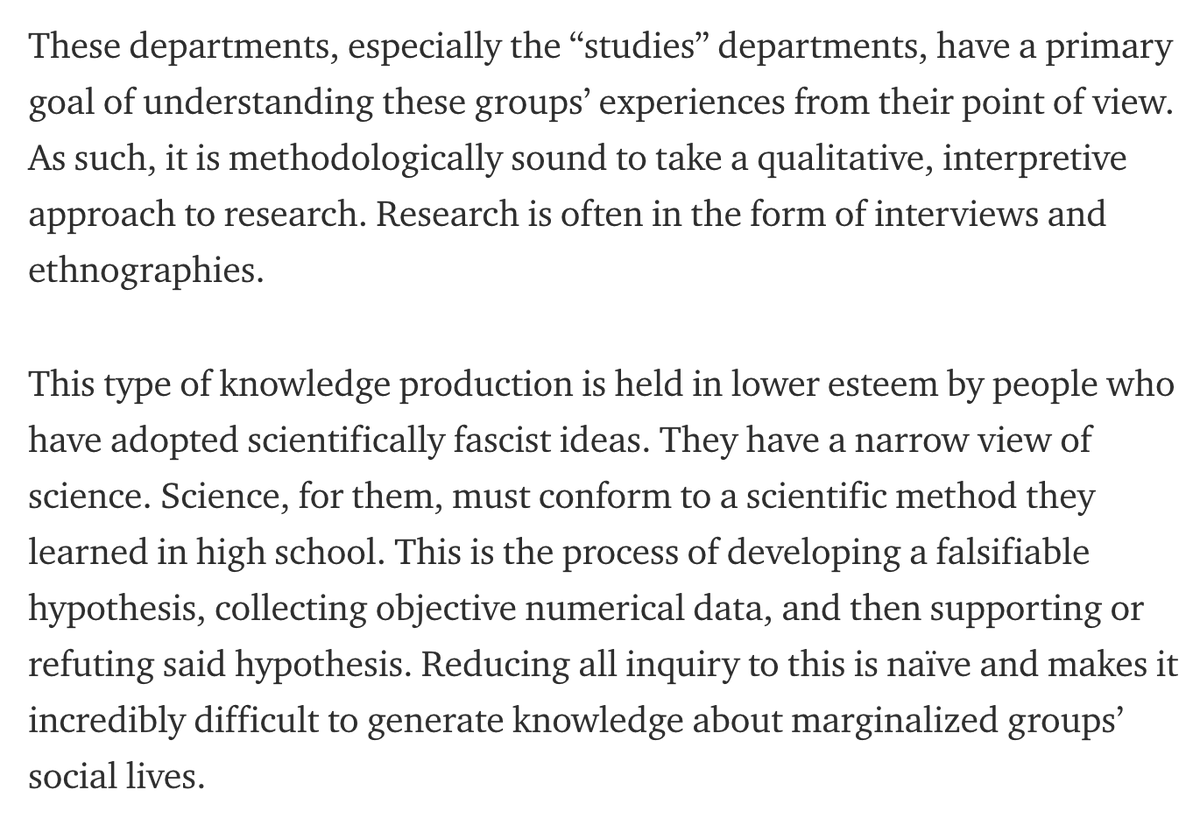"On Scientific Fascism," by the handsome and good-hearted @roderickgraham, with whom I often disagree, but whom I like and respect a great deal.
My thoughts below. https://link.medium.com/vPpD9xOVRbb
My thoughts below. https://link.medium.com/vPpD9xOVRbb
Right off the bat this is one hell of an assumption: Critics of "wokism" aren't just criticizing ideas; they're attacking the push for social justice. Rod is tacitly vilifying any and all dissent already. The mere act of pushing back is evidence of malfeasance.
Questioning or criticizing these specific ideas, institutions, or endeavors is *by design* going to maintain social inequalities, erase the experiences of minority groups, and preserve the status quo (which is terrible for these groups). Kinda makes you not wanna do it, right?
This next bit is instructive. "Scientific fascists" use science and reason as their tools of choice, to attack ideas such as "lived experience," "white fragility," and "safe spaces." Terms that, apparently, should be beyond scrutiny.
These critics are doing this because they want marginalized and minority groups to remain marginalized and minority. Again, the evil intentions of "scientific fascists" are front and center, and the vilification continues.
Rod does take time to make a "hate the sinner, not the sin" distinction, but it's undercut by his impugning of the motives of anyone who uses science and reason to criticize ideas and policy proposals generally filed under "social justice." So it's unfortunately an empty gesture.
When Rod defines "scientific fascism," the villainous intentions are further characterized by the "dismissal of people who disagree as being devoid or reason or intelligence."
In other words, a "scientific fascist" is a condescending, racist asshole.
In other words, a "scientific fascist" is a condescending, racist asshole.
Nobody likes condescending, racist assholes, and they are quite easy to spot in any exchange. They're usually quite proud to make themselves known. One wonders why we need a new term to describe those people...
One major issue to highlight is that "scientific fascism," as defined, doesn't argue that science and reason are being *mis*used, just that they're *being* used. Again, the assumption that this is being done *for unjust reasons* against an *inherent good* is the only problem.
What follows is an argument about scientific fascists wanting to impose a totalitarian kind of individualism on others, which is bizarre. I've seen some crazy stuff on Twitter, but I've yet to see someone say anything like "don't call yourself black or identify with it."
Few people argue that one *shouldn't* identify with their identity group. What many say is that an individual's traits should take precedent over their group identity, because group identity ultimately tells you very little about the person. This seems pretty uncontroversial.
Group identity is by definition a collection of broad strokes, and adhering to them on the individual level actually does much of the erasing that Rod is so worried about. I know, because it happens to me all the time. My group identities, though important, tell you very little.
There are also a number of examples of people making stupid arguments, which Rod collects and uses as evidence of a larger phenomenon—e.g., people not understanding colorism, or that egalitarianism doesn't erase individual experiences.
In other words, "nutpicking."
In other words, "nutpicking."
But they're not all nuts. Some are just interpreted as such. There is a quite deft sleight of hand when discussing the "legitimacy of lived experiences." A rather uncharitable interpretation of a Twitter comment illustrates this.
It's out of its larger context, but the tweeter seems to make sense. A single lived experience is just that—one datum. It'd be silly to craft a policy that scales society-wide on the strength of that. You'd need more, as the tweeter points out. I fail to see what's wrong there.
What follows are more examples Rod lists, of people being condescending assholes and dismissing entire fields of study or those who study them, whole-cloth.
This is not scientific or reasonable. It's just being an asshole. Again, I see no need for a neologism to describe them.
This is not scientific or reasonable. It's just being an asshole. Again, I see no need for a neologism to describe them.
Then there is a seeming misunderstanding of how and when the scientific method applies. Collecting people's experiences through interviews and ethnographies is perfectly scientific. It's how anyone would collect that data, and it's reasonable to make claims based on trends there.
However, when one wants to take the further step of suggesting that certain structures, policies, or courses of action will be effective, you are making a hypothesis, and that data alone won't suffice in proving it. That is when you must test, control for variables, etc.
Further down are more descriptions of what terrible people with terrible motives do online, and the reasons why you can call these people "scientific fascists." We get it. These people are being condescending assholes, and sometimes they're racist, too. We don't need a new name.
In my opinion, this entire endeavor is incredibly facile and unproductive. Creating this label stifles conversation further by allowing people to be dismissed with a smear that need not have been created. More thoughts on this here: https://twitter.com/StrangelEdweird/status/1332080713009664000?s=20
No matter how he dresses it up, Rod's basic conclusion is that anyone who criticizes social justice ideas and methodologies is out to erase and ignore minorities and stop the pursuit of justice in its tracks. See also: Evil.
This is a dangerous assumption to put into practice.
This is a dangerous assumption to put into practice.
Rod suggests questioning where your interlocutor got their information—not whether their points make sense. Rather than simply engaging with the arguments, find a way to dismiss them. If your critics aren't academics or activists, or sent by one, they're not worth listening to.
Rod suggests that if someone doesn't go out of their way to point out their humanitarian concerns, then their criticisms of the fallacies in your argument are in bad faith and can be ignored, rather than engaged with on their merits.
In other words, if you find yourself with a "scientific fascist," you can be a "social justice fascist" in response.
I don't see how that's helpful to discourse or the pursuit of social justice—but since I can be defined and dismissed as a scientific fascist, I guess I wouldn't.
I don't see how that's helpful to discourse or the pursuit of social justice—but since I can be defined and dismissed as a scientific fascist, I guess I wouldn't.

 Read on Twitter
Read on Twitter







